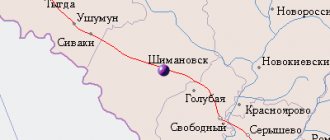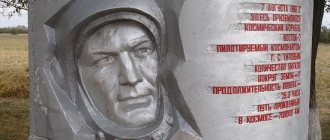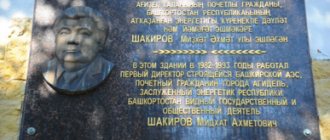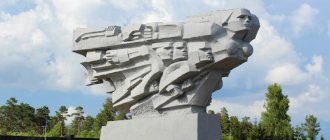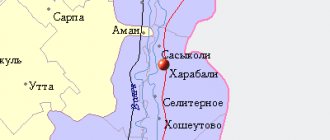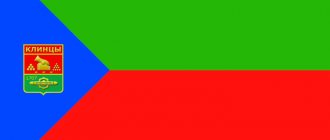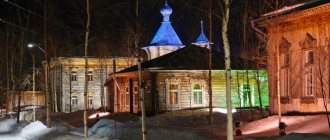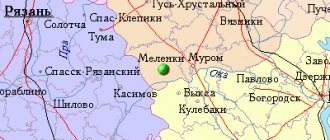This article is about the city. For the urban district, see Urban district of the city of Raichikhinsk.
| City Raichikhinsk Flag | Coat of arms |
| A country | Russia, Russia |
| Subject of the federation | Amur RegionAmur Region |
| Urban district | city of Raichikhinsk |
| Coordinates | 49°48′00″ n. w. 129°24′00″ E. d. / 49.80000° n. w. 129.40000° E. d. / 49.80000; 129.40000 (G) [www.openstreetmap.org/?mlat=49.80000&mlon=129.40000&zoom=12 (O)] (Z)Coordinates: 49°48′00″ N. w. 129°24′00″ E. d. / 49.80000° n. w. 129.40000° E. d. / 49.80000; 129.40000 (G) [www.openstreetmap.org/?mlat=49.80000&mlon=129.40000&zoom=12 (O)] (I) |
| Chapter | Viktor Fedorovich Radchenko |
| Based | 1932 |
| First mention | 1932 |
| Former names | Raichikha |
| City with | 1944 |
| Square | 225.5 km² |
| Center height | 200 |
| Population | city: ↘17,783[1] (2016) |
| Names of residents | raychikha residents, raichikhinets |
| Timezone | UTC+9 |
| Telephone code | +7 41647 |
| Postcode | 676770 |
| Vehicle code | 28 |
| OKATO code | [classif.spb.ru/classificators/view/okt.php?st=A&kr=1&kod=10420 10 420] |
| Official site | [raichikhinsk-mo.rf/ nsk-mo.rf] |
Show/hide cards
| Raichikhinsk Moscow |
| Blagoveshchensk Raichikhinsk |
K: Settlements founded in 1932
Raichikhinsk
- a city (since May 4, 1944) in Russia, in the Amur region, 165 km east of Blagoveshchensk.
Population - 17,783[1] people. (2016).
By Order of the Government of the Russian Federation dated July 29, 2014 No. 1398-r “On approval of the list of single-industry towns,” the municipal formation is included in the category “Single-industry municipal formations of the Russian Federation (single-industry towns) with the most difficult socio-economic situation”[2].
Geography
The city of Raichikhinsk is located southeast of the regional center of Blagoveshchensk.
The Raichikha River flows 10 km to the west, and the Bureya River flows 25 km to the east of the city.
About 50 km northeast of Raichikhinsk there are the Trans-Siberian Railway and the Amur federal highway (Chita - Khabarovsk).
From the Trans-Siberian Railway (from the Bureya station of the Trans-Baikal Railway) to Raichikhinsk there is a railway line (via the village of Progress).
From Raichikhinsk, exit onto the Amur federal highway:
in a western direction - through Zavitinsk; in an easterly direction - through Progress to the village. Bureya or Novobureysky.
Raichikhinsk
(Amur region)
OKATO code:
10420
Founded:
1932
Urban settlement since:
1934
City since:
1944 City of regional subordination
The city was formerly called:
| Raichikha | 1932 | 1944 |
| Telephone code (reference phone) | |
| 41647***** | 22-02-3 |
| 416474**** | — |
Deviation from Moscow time, hours:
6
Geographic latitude:
49°48′
Geographic longitude:
129°24′
Altitude above sea level, meters:
200 Sunrise and sunset times of the Sun and Moon in the city of Raichikhinsk
Climate
- Average annual air temperature - 0.5 °C
- Relative air humidity - 68.1%
- Average wind speed - 3.2 m/s
| Jan | Feb | Mar | Apr | May | Jun | Jul | Aug | Sep | Oct | But I | Dec | Year |
| −22.2 °C | −17.6 °C | −10.1 °C | 2.3 °C | 10.7 °C | 17.6 °C | 20.3 °C | 18.4 °C | 11.9 °C | 2.3 °C | −10.1 °C | −19.3 °C | 0.5 °C |
Notes
- ↑ 1234
www.gks.ru/free_doc/doc_2016/bul_dr/mun_obr2016.rar Population of the Russian Federation by municipalities as of January 1, 2016 - Order of the Government of the Russian Federation of July 29, 2014 No. 1398-r “On approval of the list of single-industry towns”
- [www.garant.ru/products/ipo/prime/doc/70017546/ Order of the Federal Agency for Railway Transport dated December 29, 2011 N 633 “On the closure of the Raichikhinsk railway station of the Trans-Baikal Railway - a branch of JSC Russian Railways” // garant. ru]
- [d[demoscope.ru/weekly/ssp/rus59_reg2.php All-Union Population Census of 1959. The size of the urban population of the RSFSR, its territorial units, urban settlements and urban areas by half]Russian). Demoscope Weekly. Retrieved September 25, 2013. [w[www.webcitation.org/6GDOghWC9 Archived from the original on April 28, 2013]/li>
- ↑ 1234567891011
www.MojGorod.ru/amursk_obl/rajchihinsk/index.html People's encyclopedia “My City”. Raichikhinsk - [d[demoscope.ru/weekly/ssp/rus70_reg2.php All-Union Population Census of 1970 The size of the urban population of the RSFSR, its territorial units, urban settlements and urban areas by gender.]Russian). Demoscope Weekly. Retrieved September 25, 2013. [w[www.webcitation.org/6GDOiMstp Archived from the original on April 28, 2013]/li>
- [d[demoscope.ru/weekly/ssp/rus79_reg2.php All-Union Population Census of 1979 The size of the urban population of the RSFSR, its territorial units, urban settlements and urban areas by gender.]Russian). Demoscope Weekly. Retrieved September 25, 2013. [w[www.webcitation.org/6GDOjhZ5L Archived from the original on April 28, 2013]/li>
- [d[demoscope.ru/weekly/ssp/rus89_reg2.php All-Union Population Census of 1989. Urban population][w[www.webcitation.org/617x0o0Pa Archived from the original on August 22, 2011]/li>
- [w[www.perepis2002.ru/ct/doc/1_TOM_01_04.xls All-Russian Population Census 2002. Volume. 1, table 4. Population of Russia, federal districts, constituent entities of the Russian Federation, districts, urban settlements, rural settlements - regional centers and rural settlements with a population of 3 thousand or more][w[www.webcitation.org/65AdCU0q3 Archived from the original source February 3, 2012]/li>
- [w[www.gks.ru/bgd/regl/b08_14t/IssWWW.exe/Stg/d/06-00.htm Cities of the Amur Region (number of inhabitants - estimate as of January 1, 2008, thousand people)] Checked 26 July 2016. [w[www.webcitation.org/6jIRa1uI5 Archived from the original on July 26, 2016]/li>
- [w[www.gks.ru/bgd/regl/B09_109/IssWWW.exe/Stg/d01/tabl-21-09.xls Number of permanent population of the Russian Federation by cities, urban-type settlements and districts as of January 1, 2009] Verified January 2, 2014. [w[www.webcitation.org/6MJmu0z1u Archived from the original on January 2, 2014]/li>
- amurstat.gks.ru/wps/wcm/connect/rosstat_ts/amurstat/resources/2b6753004d173f6bb358bbc5b34c73c1/chisl.xlsx All-Russian population census 2010. Population of urban districts, municipal districts, urban and rural settlements, urban settlements, rural settlements
- [i[irbis.amursu.ru/DigitalLibrary/Statistics/45.pdf Settlements of the Amur region as of January 1, 2012] Retrieved July 13, 2014. [w[www.webcitation.org/6R2LNMkle Archived from the original source on July 13, 2014] /li>
- [w[www.gks.ru/free_doc/doc_2013/bul_dr/mun_obr2013.rar Population of the Russian Federation by municipalities as of January 1, 2013. - M.: Federal State Statistics Service Rosstat, 2013. - 528 p. (Table 33. Population of urban districts, municipal districts, urban and rural settlements, urban settlements, rural settlements)] Retrieved November 16, 2013. [w[www.webcitation.org/6LAdCWSxH Archived from the original on November 16, 2013]/ li>
- [a[amurstat.gks.ru/wps/wcm/connect/rosstat_ts/amurstat/resources/0977a0004d173db4b2b9bbc5b34c73c1/07_1_4.htm Population estimate for urban districts, municipal districts, urban and rural settlements of the Amur region as of January 1, 2014] Checked 27 March 2014. [w[www.webcitation.org/6OOFpY4tZ Archived from the original on March 27, 2014]/li>
- [w[www.gks.ru/free_doc/doc_2015/bul_dr/mun_obr2015.rar Population of the Russian Federation by municipalities as of January 1, 2015] Retrieved August 6, 2015. [w[www.webcitation.org/6aaNzOlFO Archived from the original source 6 August 2015]/li>
Government of the Amur Region
On the map of the Amur region there is a city with an unusual name - Raichikhinsk . There are many legends about its name. Old-timers remember that it was originally called, like the river, Raichikha . This river is small, but wayward. She made her way 80 km long before she met the majestic and deep Amur. The natives called the river Ora. The Russians dubbed her Raichikha. But was this choice random? In the directory of Alexander Kirillov it is noted that the Raichikha River received its modern name “after the name of the lower military rank of Raev who drowned in it.” One thing remains attractive: the names of the river and the city seem to be warmed and illuminated by the short word “paradise”. If some cities of the Amur region owe their birth to the development of gold deposits, then Raichikhinsk began with the discovery of rich deposits of “black gold” - coal. The first information about the coal deposit was received back in 1893 from the Korneev brothers-hunters from the village of Poyarkova. In 1911, geologist Malyavin and engineer Konstantov carried out geological exploration and discovered brown coal between Raichikha and Kivda. In 1932, the official development of the coal deposit began, and the first mine in the Raichikhinsky basin was founded. At the end of the 30s, construction began on the center of the coal basin - the village of Raichikha. Its population grew rapidly.
, 1944 By decree of the Presidium of the Supreme Soviet of the RSFSR, mining settlement of Raichikha was transformed into the city of regional significance of Raichikhinsk .
The wide, straight streets of the city were given a special comfort by the unique architecture of 2- and 3-story buildings.
The cultural center of the city was cinemas, clubs with auditoriums, libraries and the House of Technology - a three-story building where film shows, lectures, amateur concerts, and recreation evenings were held. Raichikhinsk is the birthplace of Amur television. In April 1957, the Raichikhinsky Scientific and Technical Mining Society set out to build a television center in the city. December 31, 1957 – the first amateur transmitter was installed and transmitting antennas were installed. The first blue screens on Amur soil were lit in Raichikhinsk. And today local television is a distinctive feature of Raichikhinsk.
Until recently, the city-forming enterprise was the Dalvostugol joint-stock company; for its large coal reserves, the city was popularly called the “Amur Stoker”. Today the situation has changed radically and has moved to the Erkovetsky coal basin (Oktyabrsky district). Currently, the coal mining enterprise Amur Coal LLC operates on the territory of the urban district.
The social sphere is developing in the city: there are schools, gymnasiums, kindergartens, city vocational schools, an Industrial College, children's sports schools, a stadium, a municipal center for additional education for children, a House of Technology, a House of Children's Creativity, clinics, and shopping centers. An Orthodox church has been operating in Raichikhinsk for many years now. This is where the townspeople come with their aspirations and hopes.
For the residents of Raichikhinskaya, their hometown is as the poetess Maria Milinskaya saw it: On the Amur land there is a small town, You have absorbed the entire earthly paradise, Even the lotus has blossomed on your lakes For young loving hearts.
The material was prepared by the department of scientific information and use of documents of the State Institution of the Amur Region “State Archive of the Amur Region” based on the funds of the State Archive of the Amur Region
Excerpt characterizing Raichikhinsk
The hussar did not answer. - Well, don't you hear? – After waiting quite a long time for an answer, Rostov asked again. “Who knows, your honor,” the hussar answered reluctantly. - Should there be an enemy in the area? - Rostov repeated again. “It may be him, or it may be so,” said the hussar, “it’s a night thing.” Well! shawls! - he shouted at his horse, moving under him. Rostov's horse was also in a hurry, kicking the frozen ground, listening to the sounds and looking closely at the lights. The screams of voices grew stronger and stronger and merged into a general roar that could only be produced by an army of several thousand. The fires spread more and more, probably along the line of the French camp. Rostov no longer wanted to sleep. The cheerful, triumphant cries from the enemy army had an exciting effect on him: Vive l'empereur, l'empereur! [[Long live the Emperor, Emperor!] Rostov now heard clearly. - It’s not far, it must be beyond the stream? - he said to the hussar standing next to him. The hussar only sighed, without answering, and cleared his throat angrily. Along the line of hussars the tramp of a horse riding at a trot was heard, and from the night fog the figure of a hussar non-commissioned officer suddenly appeared, appearing like a huge elephant. - Your honor, generals! - said the non-commissioned officer, approaching Rostov. Rostov, continuing to look back at the lights and shouts, rode with the non-commissioned officer towards several horsemen riding along the line. One was on a white horse. Prince Bagration with Prince Dolgorukov and his adjutants went to see the strange phenomenon of lights and screams in the enemy army. Rostov, having approached Bagration, reported to him and joined the adjutants, listening to what the generals were saying. “Believe me,” said Prince Dolgorukov, turning to Bagration, “that this is nothing more than a trick: he retreated and ordered the rearguard to light fires and make noise in order to deceive us.” “Hardly,” said Bagration, “I saw them on that hill in the evening; If they left, they left there. Mr. Officer,” Prince Bagration turned to Rostov, “are his flankers still standing there?” “We’ve been standing there since the evening, but now I don’t know, your Excellency.” Order, I will go with the hussars,” said Rostov. Bagration stopped and, without answering, tried to make out Rostov’s face in the fog. “Well, look,” he said, after a short silence. - I’m listening s. Rostov gave spurs to his horse, called out to non-commissioned officer Fedchenka and two more hussars, ordered them to follow him and trotted down the hill towards the continued screams. It was both scary and fun for Rostov to travel alone with three hussars there, into this mysterious and dangerous foggy distance, where no one had been before. Bagration shouted to him from the mountain so that he should not go further than the stream, but Rostov pretended as if he had not heard his words, and, without stopping, rode further and further, constantly being deceived, mistaking bushes for trees and potholes for people and constantly explaining his deceptions. Trotting down the mountain, he no longer saw either ours or the enemy’s fires, but heard the cries of the French louder and more clearly. In the hollow he saw in front of him something like a river, but when he reached it, he recognized the road he had passed. Having ridden out onto the road, he held his horse back, undecided: to ride along it, or to cross it and ride uphill through a black field. It was safer to drive along the road that became lighter in the fog, because it was easier to see people. “Follow me,” he said, crossed the road and began to gallop up the mountain, to the place where the French picket had been stationed since the evening. - Your Honor, here he is! - one of the hussars said from behind. And before Rostov had time to see something suddenly blackened in the fog, a light flashed, a shot clicked, and the bullet, as if complaining about something, buzzed high in the fog and flew out of earshot. The other gun did not fire, but a light flashed on the shelf. Rostov turned his horse and galloped back. Four more shots rang out at different intervals, and bullets sang in different tones somewhere in the fog. Rostov reined in his horse, which was as cheerful as he was from the shots, and rode at a walk. “Well then, well again!” some cheerful voice spoke in his soul. But there were no more shots. Just approaching Bagration, Rostov again put his horse into a gallop and, holding his hand at the visor, rode up to him. Dolgorukov still insisted on his opinion that the French had retreated and only set up the fires to deceive us. – What does this prove? - he said as Rostov drove up to them. “They could have retreated and left the pickets.” “Apparently, not everyone has left yet, prince,” said Bagration. – Until tomorrow morning, tomorrow we’ll find out everything. “There’s a picket on the mountain, your Excellency, still in the same place where it was in the evening,” Rostov reported, bending forward, holding his hand to the visor and unable to contain the smile of amusement caused in him by his trip and, most importantly, by the sounds of bullets. “Okay, okay,” said Bagration, “thank you, Mr. Officer.” “Your Excellency,” said Rostov, “allow me to ask you.” - What's happened? “Tomorrow our squadron is assigned to reserves; Let me ask you to second me to the 1st squadron.
